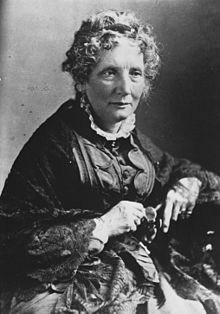The longest day must have its close -- the gloomiest night will wear on to a morning. An eternal, inexorable lapse of moments is ever hurrying the day of the evil to an eternal night, and the night of the just to an eternal day.
--Harriet Beecher Stowe, abolitionist and novelist (1811-1896)
(138:9.1) Through the dark hours of the Master's death, in the hearts of these apostles all reason, judgment, and logic were set aside in deference to just one extraordinary human emotion—the supreme sentiment of friendship-loyalty. These five months of work with Jesus led these apostles, each one of them, to regard him as the best friend he had in all the world. And it was this human sentiment, and not his superb teachings or marvelous doings, that held them together until after the resurrection and the renewal of the proclamation of the gospel of the kingdom.
Harriet Elisabeth Beecher Stowe was an American author and abolitionist. She came from the religious Beecher family and wrote the popular novel Uncle Tom's Cabin (1852), which depicts the harsh conditions experienced by enslaved African Americans. The book reached an audience of millions as a novel and play, and became influential in the United States and in Great Britain, energizing anti-slavery forces in the American North, while provoking widespread anger in the South. Stowe wrote 30 books, including novels, three travel memoirs, and collections of articles and letters. She was influential both for her writings as well as for her public stances and debates on social issues of the day.
